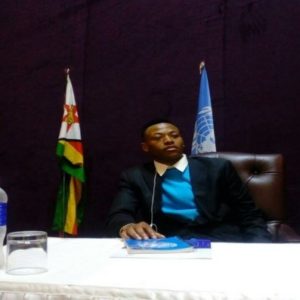Climate Education
African ministers praise youth engagement, climate literacy at COP26
December 9, 2021
On November 5, 2021 at COP26, EARTHDAY.ORG and African Youth Initiative on Climate Change engaged three African ministers from Zimbabwe, Uganda, and Kenya in an intergenerational dialogue with youth representatives.
Panelists included Hon. Lawrence Songa Bayika, legislator for the Ministry of Water and Environment of Uganda; Mr. Keriako Tobiko, cabinet secretary for the Ministry of Environment and Forestry of Kenya; Hon Nqobizitha Mangaliso Ndlovu, minister of environment, climate, tourism and hospitality industry of Zimbabwe; Brenda Mwale, of Earthday Malawi; and Elizabeth Gulugulu, programs manager for African Youth Initiative on Climate Change Zimbabwe and YOUNGO focal point for the Global South. The panel was moderated by Jean-Betrand Mhandu, Earth Day coordinator at EARTHDAY.ORG, and Jabri Ibrahim, of the office of the UN High Level Climate Action Champions Kenya.
The dialogue emphasized the role of youth in climate action programming and implementation throughout the continent. The ministers highlighted that youth have proven to be exceptional with Nationally Determined Contributions (NDCs), development, and innovations. During the COP negotiations, Kenya exemplified its commitment to youth participation with seven youth participants as part of its negotiation team.
There was a massive global call for environmental and climate literacy during COP, which was largely due in part to EARTHDAY.ORG’s Climate Literacy Campaign. As we call for climate justice, innovation, a just transition, climate finance, and behavioral change, there is a need to train and empower young people with climate and civic education.
The panelists emphasized on the need for climate education in their countries and described how they have started incorporating it in their national school and university curricula to fill this gap. While they have made progress, there is still a long way to go.
The ministers expressed the importance of engaging with and building the capacity of young people to lead climate action initiatives. Hon Nqobizitha Mangaliso Ndlovu of Zimbabwe talked about the engagement he facilitated for Zimbabwean youth to empower their peers on climate action. This engagement was led by African Youth Initiative on Climate Change Zimbabwe.
“It is very important, therefore, that in policy formulation, young people take center stage,” noted Hon Nqobizitha Mangaliso Ndlovu.
COP27 will be hosted in Africa next November. Over the next year, it is necessary for decision makers to create more synergies, put more effort into aligning national strategies to 1.5°C pathways, and invest more in green technologies and jobs.
However, COP26 failed to finalize or include some Africa-specific climate issues in the agenda, including the recognition of Africa’s special needs and circumstances. As Africa is one of the most vulnerable continents to climate change, negotiations must prioritize climate adaptation, mitigation, and restoration in Africa going into COP27.
Mr. Keriako Tobiko of Kenya spoke with concern about this issue. “We are having serious challenges here in the COP26… How do you proceed to Africa to a COP next year if in this COP you have… dropped the African special needs agenda?” he said.
Youth in the conversation discussed their capacity as African youth and the need for financial support to implement more projects to adapt to climate change and attain the NDCs.
According to Elizabeth Gulugulu, “It’s always about climate finance. You know, accessing climate finance as young people, it has always been a problem. Most of the time [when] we have climate finance available... it’s not youth friendly.”
Brenda Malawe said, “If we are to have generational success, then it has to start with involving children and young people also to own the vision, so that they can be able to keep that vision alive. We don’t want a tokenistic approach, we want meaningful youth engagement. We don’t want cherry picking of youth representatives, we want diverse engagement.”
These panelists painted a picture for a brighter future in which African youth lead the way for climate action through meaningful involvement in decision making and climate literacy. EARTHDAY.ORG urges ministers to follow through on their commitments for climate education and youth participation.
You can be part of the solution in attaining a resilient planet — team up with the EARTHDAY.ORG network in Africa and sign up as a volunteer.
